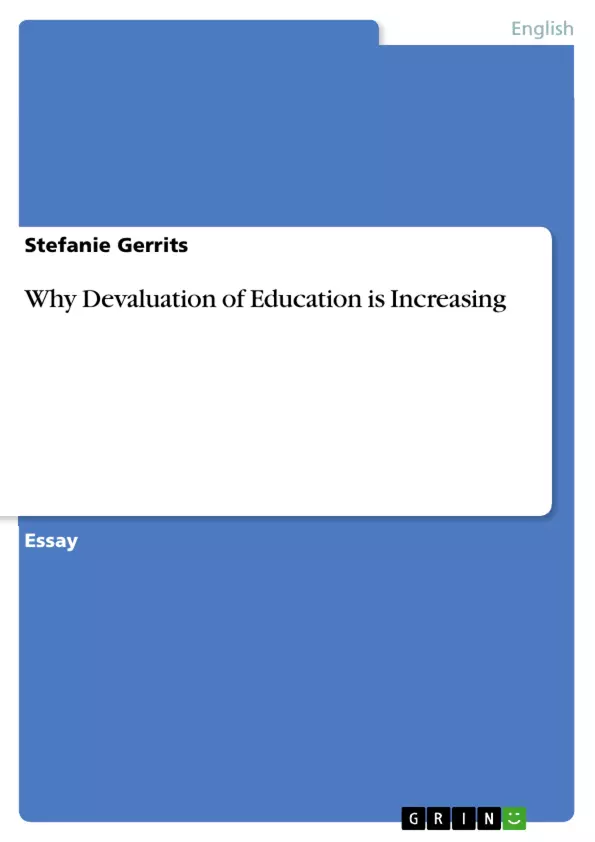‘’To me [it] devalues my education’’ (Bristow 2020). For numerous students, the value of a higher education degree has been decreasing. As a result of various globalization processes, accessibility to higher education has increased all over the world, more people of minority backgrounds and working and lower classes have access to universities and colleges. However, these positive aspects developed in combination with new challenges. Especially high costs, and therefore financial challenges, and social pressure have increasingly been deducting enjoyment and have been increasing anxiety and concerns, and consequently, have been taking personal valuation of higher education in the United States.
Inhaltsverzeichnis (Table of Contents)
- Why Devaluation of Education Is Increasing
- The US System of Higher Education
- High Costs
- Parents as a Source of Pressure
- Society's Expectations
- Recapitalizing
Zielsetzung und Themenschwerpunkte (Objectives and Key Themes)
This article explores the decreasing value of higher education in the United States. It investigates the factors contributing to this trend, focusing on the perspectives of students, parents, and society as a whole.
- Increasing costs of higher education
- Financial concerns and anxieties of students
- Pressure from parents and societal expectations
- The influence of globalization on education access and value
- The disconnect between the educational value of a degree and its perceived economic benefits
Zusammenfassung der Kapitel (Chapter Summaries)
- Why Devaluation of Education Is Increasing: This section introduces the core argument of the article: the perceived devaluation of higher education in the United States. It highlights student perspectives on the decreasing value of their degrees, linking it to factors such as rising costs and anxieties about future financial burdens.
- The US System of Higher Education: This section provides a brief overview of the diverse US higher education system, including different types of institutions and their classification based on research activity and degree offerings. It emphasizes the need to consider the complexities of the system when analyzing cost and value trends.
- High Costs: This section delves into the issue of high costs in US higher education. It presents data on tuition fees, room and board expenses, and the significant increase in student debt over recent decades. The section underscores the role of financial concerns in shaping students' perceptions of education's worth.
- Parents as a Source of Pressure: This section explores the pressure students face from their parents regarding education. It highlights the financial burden parents experience and the expectations they often project onto their children, often emphasizing the need for degrees that guarantee employment and financial stability. This pressure contributes to students' anxieties and can overshadow the intrinsic value of education.
- Society's Expectations: This section examines societal expectations that contribute to the devaluation of higher education. It discusses how rising access to higher education has created a societal norm of pursuing a university degree, leading to increased competition for jobs and potentially diminishing the value of degrees themselves.
Schlüsselwörter (Keywords)
The main keywords and focus topics of the article are: higher education, devaluation, cost, student debt, financial concerns, societal pressure, parental expectations, globalization, access, value, employment, and perceptions.
Frequently Asked Questions
Why is the value of higher education decreasing in the US?
The devaluation is driven by rising costs, high student debt, and social pressure, which often overshadow the personal and educational benefits of a degree.
How does student debt affect the perception of education?
High financial burdens increase anxiety among students, leading them to view their education as a risky economic investment rather than a personal growth opportunity.
What role do parents play in this devaluation?
Parents often project financial expectations onto their children, pressuring them to choose degrees that guarantee high-paying jobs to justify the high tuition costs.
How has globalization influenced access to higher education?
Globalization has increased accessibility for minorities and lower classes, but this positive trend coincides with intensified competition and higher costs.
Is there a disconnect between degree value and economic benefits?
Yes, while society expects a degree for most jobs, the actual economic return is often questioned by students facing stagnating wages and high debt.
- Quote paper
- Stefanie Gerrits (Author), 2020, Why Devaluation of Education is Increasing, Munich, GRIN Verlag, https://www.grin.com/document/1294384



